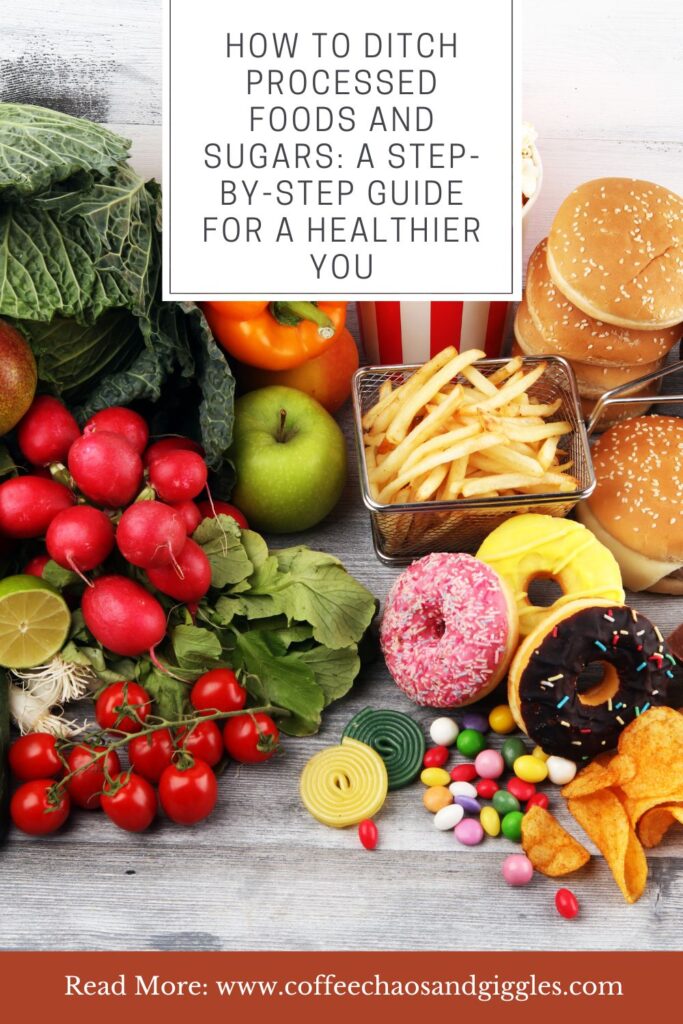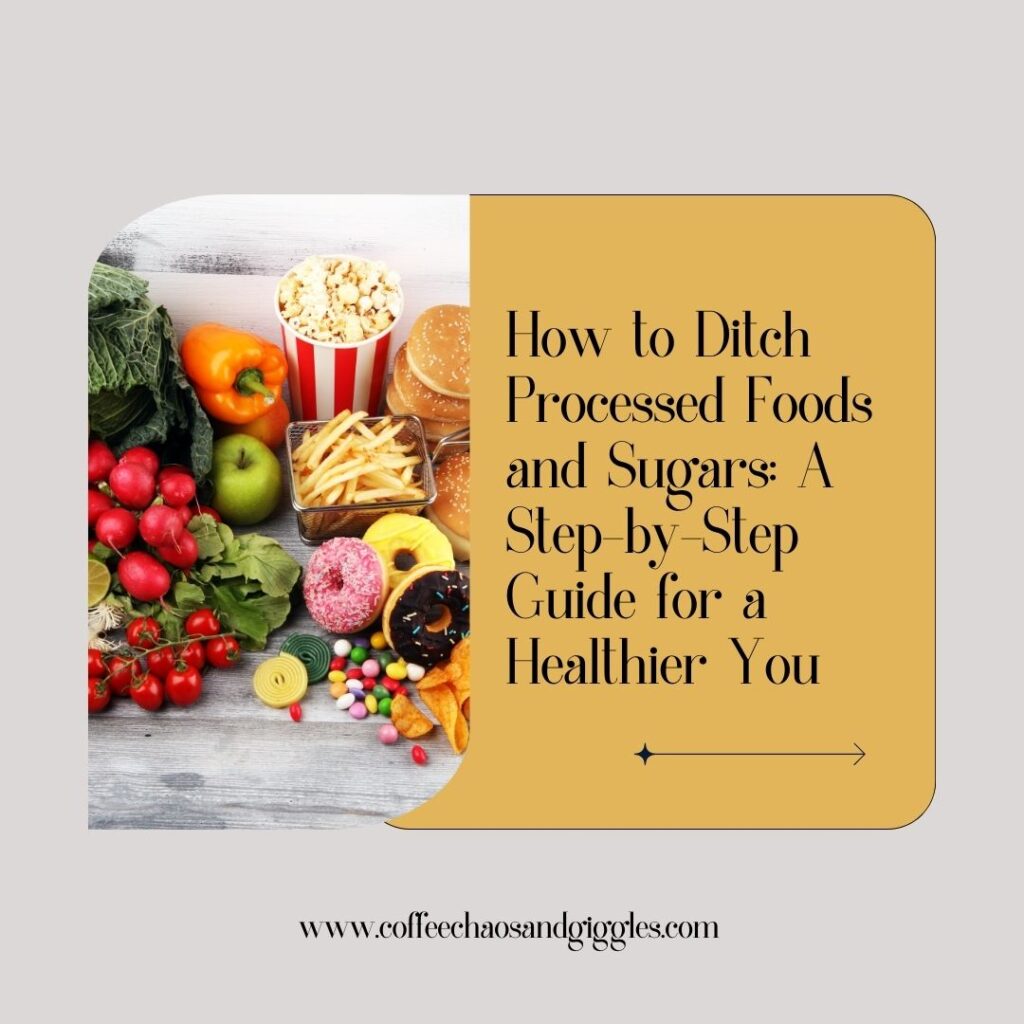How to Ditch Processed Foods and Sugars: A Step-by-Step Guide for a Healthier You
In today’s fast-paced world, processed foods and sugars are everywhere. From quick snacks to ready-made meals, they’re convenient but often come at the expense of our health. Ditching these processed ingredients and sugars can lead to increased energy, improved mood, weight loss, and overall better health. Here’s how to gradually eliminate them from your diet and make lasting changes.

1. Understand the Impact of Processed Foods and Sugars
Before diving into the steps, it’s important to know why processed foods and sugars can be harmful:
- Weight Gain and Obesity: Processed foods are often high in empty calories, sugars, and unhealthy fats, contributing to weight gain and obesity.
- Increased Risk of Chronic Diseases: Diets high in processed foods and sugars have been linked to heart disease, type 2 diabetes, and other health issues.
- Mood and Energy Fluctuations: Sugary foods can cause energy spikes followed by crashes, impacting mood and productivity.
By understanding these impacts, you’ll be more motivated to make the shift to a cleaner diet.
2. Start with Small Changes
Overhauling your diet overnight can be overwhelming, so start small:
- Replace Sugary Drinks: Swap soda, energy drinks, and sugary coffee for water, herbal tea, or flavored sparkling water.
- Cook One Extra Meal at Home: Instead of ordering takeout, plan and cook one extra homemade meal each week using whole foods.
- Read Labels: Get into the habit of reading nutrition labels. Look out for hidden sugars and unfamiliar ingredients.
3. Focus on Whole, Unprocessed Foods
One of the best ways to avoid processed foods is by focusing on whole, natural foods. Stock your pantry and fridge with:
- Fruits and Vegetables: Fresh or frozen options are great. Aim for a variety of colors to ensure a wide range of nutrients.
- Whole Grains: Brown rice, quinoa, oats, and barley are excellent unprocessed alternatives.
- Lean Proteins: Opt for chicken, turkey, fish, tofu, or legumes.
- Healthy Fats: Include avocados, nuts, seeds, olive oil, and coconut oil.
4. Prepare Your Meals and Snacks
One of the biggest challenges in avoiding processed foods is convenience. Preparing meals and snacks in advance can help:
- Meal Prep for the Week: Set aside time each week to cook and portion meals. Consider easy recipes like stir-fries, soups, salads, and roasted vegetables.
- Healthy Snack Alternatives: Instead of chips and candy, prepare snacks like sliced veggies with hummus, fruit, nuts, or homemade energy balls.
- Batch Cooking: Double or triple recipes so you always have healthy options ready, even when life gets busy.
5. Reduce Sugar Gradually
Cutting out sugar completely can be difficult and lead to intense cravings. Instead, reduce your intake gradually:
- Cut Back on Sweets: If you eat sweets daily, try cutting back to a few times a week, then gradually to once a week. Opt for dark chocolate or fruit when you want a sweet treat.
- Use Natural Sweeteners: Replace refined sugar with honey, maple syrup, or stevia, but remember that moderation is still key.
- Avoid Hidden Sugars: Watch out for sugars hidden in foods like salad dressings, sauces, yogurt, and granola bars. Opt for homemade versions where you control the ingredients.
6. Stay Hydrated
Staying well-hydrated helps reduce cravings and flushes out toxins from processed foods. Aim to drink at least 8 glasses of water a day. You can also:
- Add fresh lemon, mint, or cucumber slices for flavor.
- Drink herbal teas to replace sugary beverages.
7. Listen to Your Body
As you transition away from processed foods and sugars, pay attention to how your body feels:
- Increased Energy: Many people report feeling more energized and less sluggish when they eat whole, unprocessed foods.
- Improved Mood: Stable blood sugar levels can lead to a more balanced mood and fewer energy crashes.
- Better Digestion: Removing processed foods often improves gut health, leading to better digestion and less bloating.
8. Plan for Setbacks and Celebrate Progress
It’s normal to have setbacks, especially when changing your eating habits. The key is to:
- Plan for Challenges: If you’re dining out or attending events, look at menus beforehand to find the healthiest options.
- Be Kind to Yourself: If you slip up, don’t dwell on it. Focus on getting back on track with your next meal.
- Celebrate Wins: Acknowledge small victories, like choosing a healthy snack over a processed one, and use these moments to motivate yourself.
9. Get Support
Changing your diet can be tough, but having support can make a big difference:
- Join a Group: Find online communities or local groups where you can share tips, recipes, and motivation.
- Find an Accountability Partner: Having someone to check in with can help keep you on track and committed to your goals.
- Work with a Nutritionist: If you’re struggling, a professional can provide personalized guidance and support.
10. Embrace a Sustainable Approach
The goal is to make lasting changes, not to follow a temporary diet. By embracing a sustainable approach:
- Make it Enjoyable: Experiment with new recipes, try new foods, and find meals you truly enjoy.
- Balance and Moderation: It’s okay to indulge occasionally. The key is finding a balance where the majority of your meals are healthy, whole foods.
- Focus on How You Feel: Remember that the ultimate goal is to feel better, have more energy, and live a healthier life.

Here are some of the most common processed foods. We’ve also listed some substitutions to consider!
Ditching processed foods and sugars is a journey that takes time and effort, but the benefits to your health and well-being are worth it. Start small, stay consistent, and remember that every small step forward is progress. Here’s to a healthier, more vibrant you!
Processed foods are those that have been altered from their natural state through methods like adding preservatives, flavors, or other artificial ingredients. They are often convenient but may lack nutrients and contain unhealthy fats, sugars, and sodium. Below are some of the most common forms of processed foods and healthier substitutions:
1. Sugary Breakfast Cereals
- Processed Version: Many breakfast cereals contain high levels of sugar, artificial flavors, and colors.
- Substitutions:
- Oatmeal topped with fresh fruit, nuts, and a drizzle of honey or maple syrup.
- Whole grain muesli or granola (low-sugar, homemade or from natural brands).
- Greek yogurt with berries and a sprinkle of seeds.
2. White Bread and Pastries
- Processed Version: White bread, bagels, and pastries are made from refined flour, often with added sugars and preservatives.
- Substitutions:
- Whole grain or sprouted bread.
- Homemade muffins using almond flour or oats.
- Rice cakes topped with nut butter and fruit.
3. Soda and Sugary Drinks
- Processed Version: Soft drinks, energy drinks, and sugary teas are loaded with sugars and artificial sweeteners.
- Substitutions:
- Sparkling water flavored with fresh fruit or a splash of natural juice.
- Unsweetened iced tea or herbal tea.
- Coconut water or homemade fruit-infused water.
4. Chips and Salty Snacks
- Processed Version: Potato chips, cheese puffs, and crackers often contain high levels of sodium, unhealthy fats, and artificial flavors.
- Substitutions:
- Air-popped popcorn seasoned with herbs or nutritional yeast.
- Baked sweet potato or kale chips.
- Raw veggies with hummus or guacamole.
5. Frozen Dinners and Instant Meals
- Processed Version: Pre-packaged dinners and instant noodles often contain high sodium levels, preservatives, and artificial ingredients.
- Substitutions:
- Cooked quinoa or brown rice bowls with roasted veggies and a protein source.
- Homemade soups or stews prepared in bulk and frozen for later use.
- Stir-fries made with fresh vegetables and lean proteins.
6. Packaged Sweets (Cookies, Candy, and Cakes)
- Processed Version: These treats are usually high in sugar, refined flour, and trans fats.
- Substitutions:
- Dark chocolate (70% or higher) for a healthier indulgence.
- Fresh fruit or dried fruit (unsweetened) for natural sweetness.
- Homemade baked goods using whole grain flours and natural sweeteners like honey or maple syrup.
7. Processed Meats (Bacon, Sausages, and Deli Meat)
- Processed Version: These meats are often high in sodium, nitrates, and preservatives.
- Substitutions:
- Fresh, lean meats like chicken, turkey, or fish.
- Grilled or baked tofu as a plant-based protein option.
- Homemade grilled chicken slices for sandwiches and salads.
8. Canned Soups and Sauces
- Processed Version: These can be high in sodium and contain preservatives or added sugars.
- Substitutions:
- Homemade soup made from fresh vegetables, herbs, and broth.
- Tomato sauce prepared at home with fresh tomatoes, garlic, and herbs.
- Low-sodium canned beans and vegetables for convenience but without added preservatives.
9. Flavored Yogurts
- Processed Version: Many flavored yogurts contain added sugars, artificial flavors, and colors.
- Substitutions:
- Plain Greek yogurt with fresh fruit and a drizzle of honey.
- Unsweetened coconut or almond yogurt topped with nuts and seeds.
- Homemade chia pudding made with unsweetened milk and fruit.
10. Instant Oatmeal Packs
- Processed Version: Instant oatmeal often has added sugars and artificial flavors.
- Substitutions:
- Rolled oats or steel-cut oats cooked with milk or water, topped with fresh fruit.
- Overnight oats prepared with whole grains and mixed with yogurt and fruit.
- Homemade oatmeal bars using nuts, seeds, and natural sweeteners.
By making these simple swaps, you can reduce your intake of processed foods and enjoy whole, nutrient-rich meals that support your overall health.




